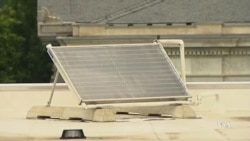Two universities in Washington, D.C., soon plan to start buying half of their electricity from solar-power farms 400 kilometers away. The schools expect the project will save millions of dollars during the next couple of decades and make the universities more attractive to environmentally-conscious students.
Experts say the project shows how this once-exotic power source is becoming a routine part of business.
Solar panels cover the roof of this and other buildings at American University, creating electricity that is a fraction of the power needed by the campus.
Solar power farms
AU, George Washington University, and George Washington University Hospital are going a big step further in a deal with Duke Energy Renewables, a division of a large power company.
Duke will build three new solar power farms, similar to these facilities, in distant North Carolina and put the power into the electric grid.
The schools in Washington will draw electricity from the grid and pay Duke for the power at a fixed rate for the next 20 years.
Chief Financial Officer of American University Doug Kudravetz said the green solar power deal will look better and better over time.
"Over the next 20 years, we are confident that [the price of] brown power can only go in one direction [higher cost], saving quite a bit of money over that period of time," said Kudravetz.
American University’s director of sustainability, Chris O’Brien, said using renewable energy instead of “brown power,” traditional oil, coal, or gas-fueled electricity, will reduce the environmental impact of campus activities.
“It is the right thing for social equity because some of the worst impacts of climate change are borne by the poor. So to the degree we can convert to renewable reduces the impact on people who live in poverty," said O'Brien.
Growing power source
There are a growing number of solar facilities around the world. Duke Energy Renewables' new units will have nearly a quarter of a million solar panels, and it will generate 123 million kilowatt hours of electricity per year. The switch away from fossil fuel will have the same environmental benefit as getting 12,500 cars off the road.
Rhone Resch, the head of the Solar Energy Industries Association, said, “This is an innovative, new type of business model for solar. It shows that you can go solar, no matter if you have roof space, or if you are entering into a contract with a developer. I think this is the future of solar energy, and we are seeing it today.”
Resch said solar is growing fast, but he admitted that it provides just a small fraction of the electricity needed to run the world’s biggest economy. He said falling prices for equipment and innovations in financing now are doing as much as technical developments to spread solar energy.
In the meantime, students at American University take advantage of a solar water heater on the roof of a campus building that pre-heats water for coffee and saves energy in a shop several floors below.





